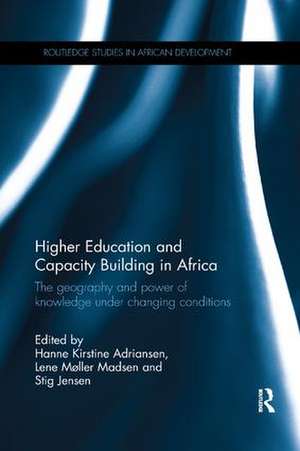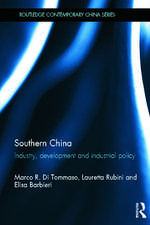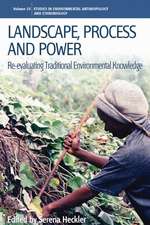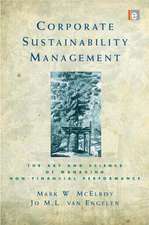Higher Education and Capacity Building in Africa: The geography and power of knowledge under changing conditions: Routledge Studies in African Development
Editat de Hanne Kirstine Adriansen, Lene Madsen, Stig Jensenen Limba Engleză Paperback – 4 dec 2017
Higher Education and Capacity Building in Africa contests such universalistic notions. Inspired by ideas about the ‘geography of scientific knowledge’ it explores what role specific places and relationships have in knowledge production, and analyses how cultural experiences are included and excluded in teaching and research. Thus, the different chapters show how what constitutes legitimate scientific knowledge is negotiated and contested. In doing so, the chapters draw on discussions about the hegemony of Western thought in education and knowledge production. The authors’ own experiences with higher education capacity building and knowledge production are discussed and used to contribute to the reflexive turn and rise of auto-ethnography.
This book is a valuable resource for researchers and postgraduate students in education, development studies, African studies and human geography, as well as anthropology and history.
| Toate formatele și edițiile | Preț | Express |
|---|---|---|
| Paperback (1) | 449.41 lei 6-8 săpt. | |
| Taylor & Francis – 4 dec 2017 | 449.41 lei 6-8 săpt. | |
| Hardback (1) | 1113.32 lei 6-8 săpt. | |
| Taylor & Francis – 9 noi 2015 | 1113.32 lei 6-8 săpt. |
Din seria Routledge Studies in African Development
-
 Preț: 348.19 lei
Preț: 348.19 lei -
 Preț: 284.45 lei
Preț: 284.45 lei -
 Preț: 318.10 lei
Preț: 318.10 lei -
 Preț: 238.37 lei
Preț: 238.37 lei - 14%
 Preț: 336.93 lei
Preț: 336.93 lei - 18%
 Preț: 1000.27 lei
Preț: 1000.27 lei -
 Preț: 390.80 lei
Preț: 390.80 lei -
 Preț: 386.00 lei
Preț: 386.00 lei - 18%
 Preț: 934.74 lei
Preț: 934.74 lei - 18%
 Preț: 1000.27 lei
Preț: 1000.27 lei - 18%
 Preț: 891.36 lei
Preț: 891.36 lei -
 Preț: 190.02 lei
Preț: 190.02 lei - 17%
 Preț: 267.77 lei
Preț: 267.77 lei - 9%
 Preț: 869.19 lei
Preț: 869.19 lei -
 Preț: 363.00 lei
Preț: 363.00 lei - 17%
 Preț: 258.50 lei
Preț: 258.50 lei -
 Preț: 443.65 lei
Preț: 443.65 lei -
 Preț: 479.63 lei
Preț: 479.63 lei - 18%
 Preț: 1054.71 lei
Preț: 1054.71 lei -
 Preț: 461.84 lei
Preț: 461.84 lei -
 Preț: 449.41 lei
Preț: 449.41 lei -
 Preț: 383.30 lei
Preț: 383.30 lei - 18%
 Preț: 1113.32 lei
Preț: 1113.32 lei - 20%
 Preț: 254.45 lei
Preț: 254.45 lei -
 Preț: 463.19 lei
Preț: 463.19 lei - 18%
 Preț: 997.11 lei
Preț: 997.11 lei - 17%
 Preț: 259.10 lei
Preț: 259.10 lei - 18%
 Preț: 1000.27 lei
Preț: 1000.27 lei -
 Preț: 488.29 lei
Preț: 488.29 lei -
 Preț: 186.53 lei
Preț: 186.53 lei - 18%
 Preț: 1000.27 lei
Preț: 1000.27 lei -
 Preț: 442.07 lei
Preț: 442.07 lei
Preț: 449.41 lei
Nou
Puncte Express: 674
Preț estimativ în valută:
85.99€ • 90.03$ • 71.15£
85.99€ • 90.03$ • 71.15£
Carte tipărită la comandă
Livrare economică 05-19 aprilie
Preluare comenzi: 021 569.72.76
Specificații
ISBN-13: 9780815394051
ISBN-10: 0815394055
Pagini: 262
Ilustrații: 2 Line drawings, black and white; 10 Halftones, black and white; 12 Illustrations, black and white
Dimensiuni: 156 x 234 mm
Greutate: 0.45 kg
Ediția:1
Editura: Taylor & Francis
Colecția Routledge
Seria Routledge Studies in African Development
Locul publicării:Oxford, United Kingdom
ISBN-10: 0815394055
Pagini: 262
Ilustrații: 2 Line drawings, black and white; 10 Halftones, black and white; 12 Illustrations, black and white
Dimensiuni: 156 x 234 mm
Greutate: 0.45 kg
Ediția:1
Editura: Taylor & Francis
Colecția Routledge
Seria Routledge Studies in African Development
Locul publicării:Oxford, United Kingdom
Public țintă
PostgraduateCuprins
1. Why study higher education and capacity building in Africa? An introduction 2. Do ‘African’ universities exist? Setting the scene Part I: Capacity building of African universities – asymmetrical power relations? 3. Dilemmas of knowledge production in Ugandan Universities 4. Collaborative education across continents: lessons from a partnership on sustainable resource management education 5. The Confucius Institute at the University of Zambia: a new direction in the internationalisation of African higher education? Part II: Researching and teaching climate change in Africa – whose reality counts? 6. Power of knowledge under changing conditions: lessons from a Sahelian village under climate change 7. Producing scientific knowledge in Africa today: auto-ethnographic insights from a climate change researcher 8. Negotiating scientific knowledge about climate change: enhancing research capacity through PhD-students Part III Creating and using academic knowledge in Africa – decolonising research? 9. My knowledge, your knowledge, whose knowledge is it? Reflections from a researcher’s journey through universities in North and South 10. Creating an African university: struggling for a transformational curriculum in apartheid South Africa 11. African Universities and rights in African polities, cultures and communities: Africanising universal knowledge? Conclusion 12. Dilemmas and paradoxes of capacity building in African higher education: concluding remarks
Descriere
This book takes an innovative approach to understanding the development of African universities. It explores what role specific locations have in the making of research and analyses how local experience is addressed in teaching and in research. The first section focuses on capacity building in the university sector. The book uses researching and teaching climate change as examples of how knowledge is negotiated and academic identities built locally. In doing so, the book draws on discussions about knowledge constructions, hybrid knowledges, and the effects of modernity. It also discusses the future role in society of African universities.












